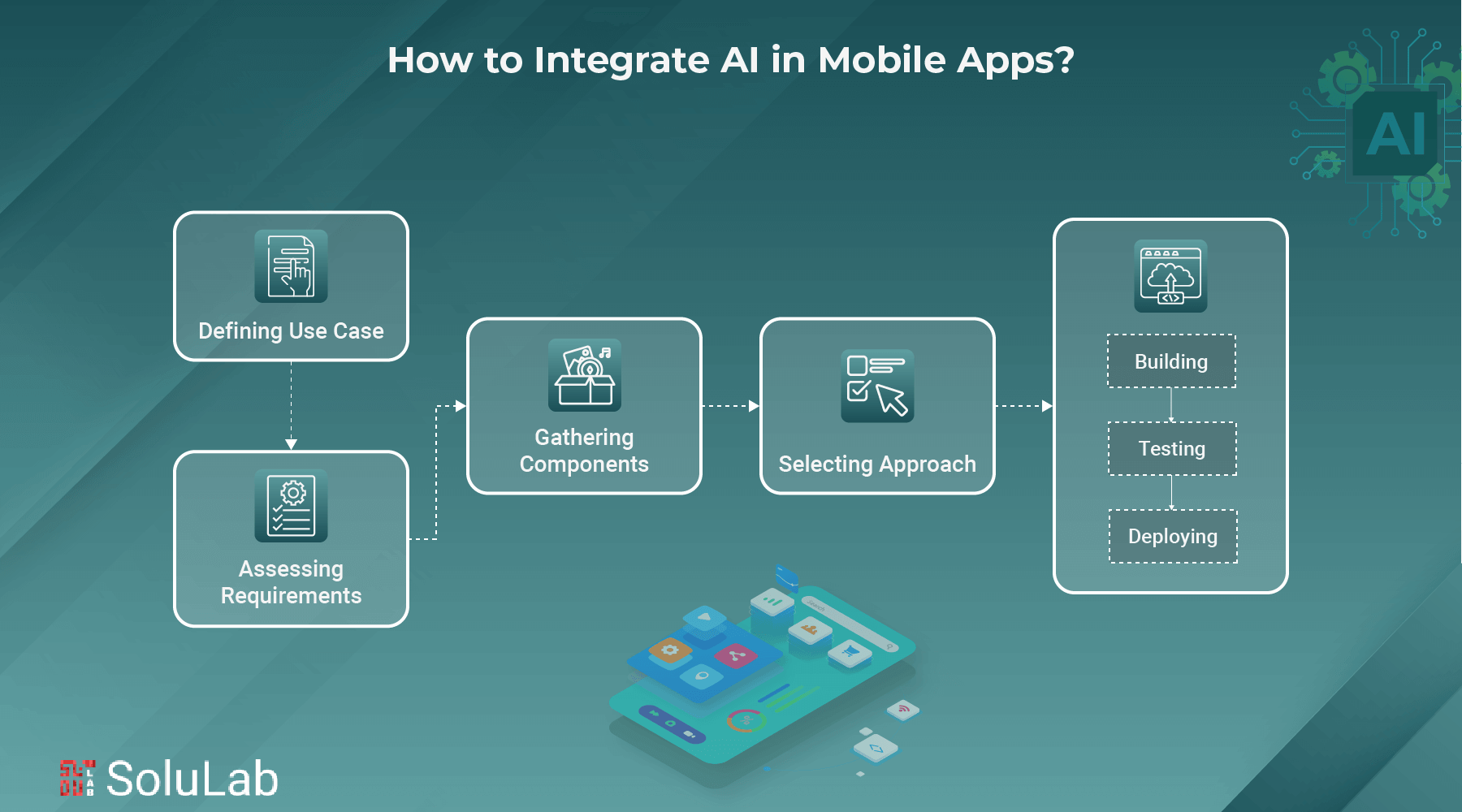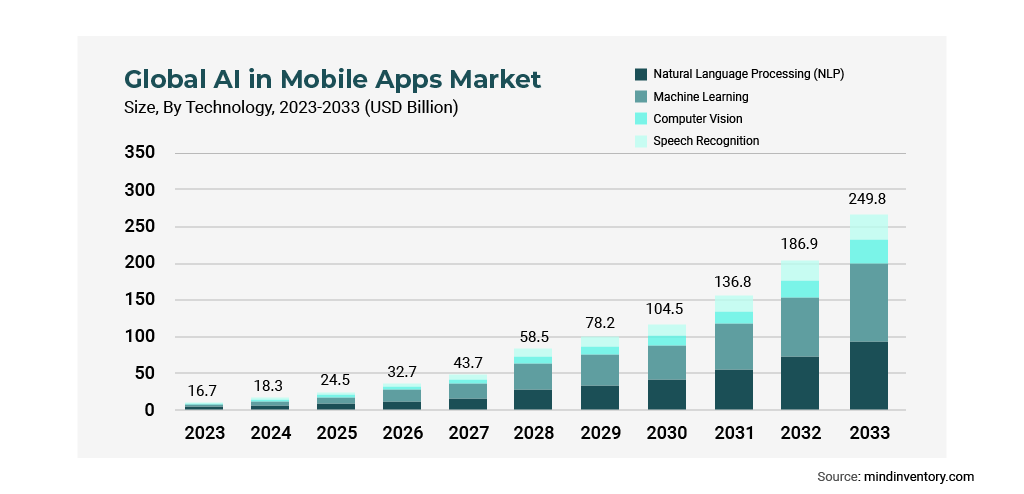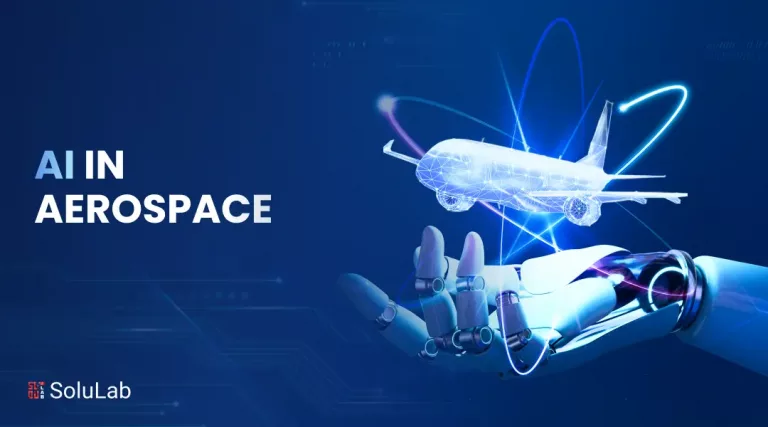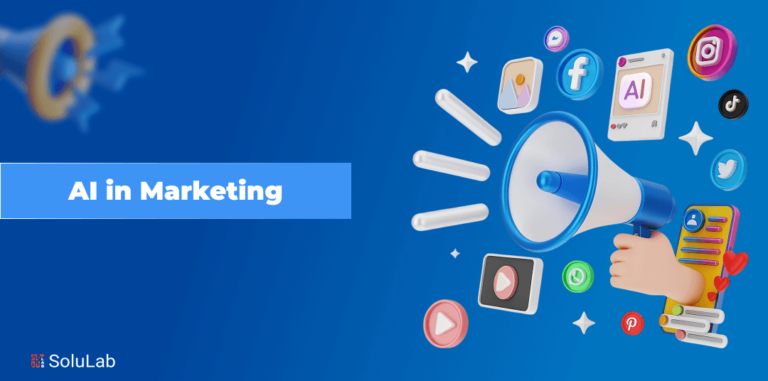
AI has truly made a significant impact on the constantly changing world of mobile development. Given the complexity that defines this technological area, knowing how AI will impact mobile applications in the future is essential. Imagine a smartphone with an intuitive, personalized UI that understands and expects user preferences. This is what AI can do in developing mobile apps. It differs from conventional programming in that it gives apps the ability to learn and adapt, which boosts user pleasure and engagement.
A unique fusion of AI features and creative apps across multiple industries is currently taking place in the development of the mobile applications industry. In 2020, the global mobile market, of artificial intelligence was estimated to be worth $8.56 billion, when we fast forward to 2030, the number will rise to an astounding $84.80 billion with a projected compound annual growth rate of 26.44% from 2021 to 2030, this exponential growth rate indicates that AI will have a constantly growing influence on mobile applications that will shape the future.
What comes next? This blog will keep you aware of even more creative developments in the future. The environment is vast, ranging from AI lead automation that alters logistical procedures to AI that announces user experience. Without question, the integration of AI logistics applications presents excellent opportunities for companies to streamline their supply chain while cutting costs and increasing efficiency.

What is Artificial Intelligence?
The technologies that allow computers and other devices to mimic human learning, comprehension, problem-solving, decision-making, creativity, and autonomy are known as artificial intelligence. AI-enabled apps and gadgets can see and recognize items. They can understand and react to human words, they can pick up new knowledge and skills. They can provide consumers and specialists with thorough advice. A self-driving car is a prime example of how it can behave, auto autonomously, navigating the requirement for human knowledge or involvement. Involvement.
However, the majority of practitioners and researchers in 2024 and the majority of AI-related news stories are centered on developments in generative AI or “genAI”, a system that can produce original photos, writing, videos, and other types of material. Understanding deep learning and machine learning, the technologies underpinning generative AI tools is crucial to understanding generative AI.
What Role Does AI Play in the Creation of Mobile Apps?
More than just a passing trend, the use of artificial intelligence in the development of mobile applications shapes the characteristics, potential, and development of apps. Let’s now explore contemporary AI and NLP applications in mobile app development using actual scenarios that demonstrate the potential of this technology.
1. Customized User Interfaces
Mobile apps that incorporate AI can better understand user preferences, and habits, giving each user a unique experience. Consider the recommendation system seen in entertainment apps like Netflix and Spotify, for instance, they learn from user interactions to suggest films, television series, and songs according to the user preferences to increase user pleasure and engagement.
2. Chatbots and VR
AI-powered chatbots and virtual assistants have transformed the way people interact with technology. Apps like Alexa and Google Assistant use NLP to record user inquiries. Chatbots are also used in logistics apps to provide real-time shipping information, respond to client inquiries, and facilitate speedy communication processes that improve user experience.
3. Improved Capabilities
Predictive analytics powered by AI transform mobile applications, for example, algorithms in finance apps, analyze spending trends, and forecast future expenses offering guidance for better financial planning. It is used in the logistics industry to improve supply chains, and overall efficiency and predict shifts in demand.
4. Voice and Picture Recognition
AI is used by mobile apps for advanced voice and picture recognition. These features include voice commands on navigation, applications, facial recognition in camera, applications as well as language translation like idict. AI which uses AI to understand and respond to sounds and images.
5. Fraud Identification
Developing mobile apps, and securities is essential. Artificial intelligence systems, excel, support irregularities and trends that can indicate fraud. Banking acts, for example, use AI to analyze transaction patterns and quickly identify questionable activity to secure accounts right away.
Applications of AI in Mobile App Development
Examining successful case studies from a variety of industries reveals the transformational nature of artificial intelligence in mobile app development. These applications highlight the significant positive effects on consumer engagement, income, and other crucial metrics in addition to demonstrating the versatility of AI use cases and applications:
Starbucks Customer Engagement Driven by AI
Starbucks, a pioneer in fusing technology and consumer experience, has employed AI to track the activity of its mobile applications. Using artificial intelligence (AI), the app may learn user preferences, provide personalized drinks, and potentially streamline the ordering process. Starbucks has increased consumer pleasure and loyalty with distinctive, individualized promotions and rewards based on behavior. In contrast to earlier systems, artificial intelligence has become a seamless part of the process, as seen by user behavior that boosts sales and fosters strong brand loyalty.
Spotify Targeted Music Suggestions
AI is used by the well-known music streaming app Spotify to provide customers with personalized playlists and suggestions. To modify their recommendations appropriately, Spotify’s AI algorithms take into account user listening habits, favorite genres, and even shifts in mood. Their degree of customization has significantly increased user engagement and kept people on the site for extended periods, increasing connection rates and a notable rise in revenue were the outcome.
Snapchat Filters for Augmented Reality (AR)
By utilizing AR as one of its standard functional elements, Snapchat, a modern social media platform with visually appealing and practical filters, has managed to apply AI. These filters can recognize facial traits and incorporate interactive components because they are based on AI algorithms. In addition, it attracts customers through participation, Snapchat’s AR filters also attract sponsorships and partnerships. These filters are used by brands to produce and create advertisements, which gives Snapchat an income stream each time a user applies one and increases user satisfaction.
Duolingo Adaptive Learning
A lot of e-learning businesses make use of artificial intelligence within their products to offer personalized suggestions. For example, the language-learning program Duolingo aims to provide its users with the path to learning that works best for them. Nonetheless, the software adapts to each user’s unique progress, talents, and shortcomings to ensure that they receive customized exercises to enhance their language learning experience. The artificial intelligence-powered adaptive learning methodology has produced startling gains in user skill and retention. User continues to be engaged and productive in what they learn, which contributes to Duolingo’s standing as a leading language program.
Uber Predictive Analytics
The massive right-sharing company. Uber uses artificial intelligence for productive analytics to improve operational effectiveness and customer satisfaction. By anticipating demand trends, the software enables drivers to be strategically positioned and passenger weight to be optimized. Uber has seen an increase in earnings during peak hours by using AI to dynamically price its services based on demand. In addition to improving client satisfaction, precise forecasts are essential to the platform’s overall effectiveness.
A powerful tool for making money, whether it is used to increase subscription purchases through private recommendations or AI-assisted advertising. Furthermore more implementing AI trends to improve operational efficiency, which lowers cost and promotes a high level of corporate success. These AI application solutions show how they may transform organizations. It’s time to follow the changes or the change of trend by delivering creative AI solutions to satisfy users.
Benefits of AI in Mobile App Development
In the field of developing mobile apps, AI is starting to transform the game. AI is transforming how we create a utilized mobile app, from improving user experience to expediting the development process. Here is a closer look at how it is benefiting the field of mobile app development:
- Improved UX: To provide a genuinely customized experience, AI algorithms can examine the behavior of users, their preferences, and their context. Consider a News app that curates feeds according to your preferences. An I-driven chatbot can efficiently respond to user inquiries, voice-based communication is growing in popularity and a few of the functions made possible by AI. AI forecasts use requirements and activities by examining patterns and user behavior enable developers to propose pertinent features, preload, content, and for usage before they even materialize.
- Simplified Development Procedure: Artificial intelligence may generate a boilerplate code of fundamental functionality, among other repetitive coding duties. This promotes quicker development cycles and provides developers with more time to work difficult jobs. AI-driven technologies can examine code for any errors, flaws, and efficiencies. This results in higher-quality apps. Additional intelligence can also automate several mobile app testing duties, such as creating test cases, locating H cases, and carrying out India operations.
- Advanced Features of App: Apps can unleash powerful functionality by integrating machine learning models, for example, object detection with augmented reality using AI, image recognition-based functions in photo editing apps, or facial recognition for safe login. This examines data about performance and locates performance-affecting bottles. Apps can get greater context awareness by utilizing AI and location services. Consider a travel app that automatically translates menu in science in the area or a Fitness app that can customize recommendations of workouts based on the weather.
How to Integrate AI in Mobile Apps?
It takes considerable preparation and execution to incorporate AI with AI development companies into current applications. Without a methodical approach, the procedure may become too much to handle or may not produce the intended outcomes. Five crucial steps are outlined to help you successfully integrate AI into apps:
-
Defining Use Case
As in the case with the majority of issues, the first step in integrating AI into applications is to define the problem that this integration might solve. As a result, the first thing that has to be done is to describe what case is this addition of AI being used for.
-
Assessing Requirements
Once you have defined the use case and the reason behind the integration of the AI, the next step is to determine whether or not the requirements of the integration are available. If you wish to develop an integration that would automatically generate product descriptions, for instance, you will be required to verify that there are some fundamental product characteristics available rather than a list of stock-keeping units.
-
Gathering Components
In the third stage, you will need to make certain that you already have all of the components that are required to construct integrations. The majority of the time, this consists of things like API tokens, subscriptions to other applications in which AI needs to be integrated, and other similar things.
-
Selecting Approach
After this, you would come to a point where you are prepared to go to the next phase, which is selecting the technique of integration. Depending on factors such as technical skills, finances, and no-time deployment, you will most likely have to choose between a code and a code-first strategy, and you will also have to decide whether to develop it internally or obtain it from an outside source.
-
Building, Testing, and Deploying
The next step build and test the AI system before placing it into operation. In this phase, designers create the connection and then test it using regular production procedures to deliver working AI technology. Successful installation results depend on complete testing procedures.
Challenges of Integrating AI Into Mobile Apps
Although integrating AI into mobile app development has a lot of potential, there are a few obstacles that developers must overcome:
- Privacy and Data Security: The way an AI system performs depends on the user data it needs to train and operate. Doing business with personal client data requires protecting it and sticking to privacy rules, especially the CCPA and GDPR. A lack of proper data security controls carries legal and corporate brand risks.
- Bias and Explainability: If AI learns these biases during training it will repeat them as the final model outcome. Because AI systems have intricate algorithms users find them hard to decode. User trust needs ethical app development through technology that illustrates its working principles clearly and fairly.
- Integration and Development: Adding AI features to mobile apps demands both advanced knowledge and advanced technology plus extra development support. The development process includes picking great AI models plus connecting the new technology to existing app systems. Teams must study all expenses and expected results plus determine how much AI will grow into the future before starting to build AI solutions.
To solve these problems you need a smart approach that handles both innovative solutions and proper oversight. Developers can make AI safer and more effective when they base their work on security controls and fair access plus they can make AI work better for longer.
Conclusion
Artificial intelligence now transforms the mobile app development field by sparking innovation while improving how businesses connect with their users. AI brings new app capabilities and makes users enjoy apps better by adding smart data analysis power with customized features plus enhanced speech understanding and skill adaptation. Mobile developers can now make better solutions for different sectors because they include AI features in their apps.
The opportunities of AI appear alongside major technical difficulties. We at AI development company SoluLab with Enmatrix are transforming connected device management, whether you are on a boat or in a building. It enables users to effortlessly control light, climate, surveillance footage, usage of energy, and more, all through a single, automated platform thanks to its user-friendly design and highly adaptable interface. For a contemporary, connected lifestyle, Enmatrix provides outstanding usability by fusing convenience with advanced IoT technology.
Reach out to SoluLab today to experience AI in mobile app development and create your vision differently.
FAQs
1. Will AI ever replace the creation of mobile apps?
Given the benefits and opportunities AI presents to companies, it will eventually play a crucial role in the creation of mobile apps, you may attain human-like intelligence, hyper-personalization, and efficient workflows but it will not completely replace creation.
2. What role may AI play in development?
By automatically producing code fragments or complete functionalities, AI-powered solutions can help engineers and drastically cut down on development time. This automation frees up developers to concentrate on high-level tasks like problem-solving and design.
3. Does AI have a future in app development?
This development and advancement are made feasible by technological advancements like wearables, 5G, AI, ML, and no code. By 2025 the global AI market will be worth around $126 billion demonstrating that AI is the future of app development.
4. Can ChatGPT develop an application?
Yes, you can make an app for free without the need to pay experts, with a little effort, and appropriate resources, ChatGPT can help you navigate development tools like Android Studio, and offer tips and cold samples.
5. How is SoluLab using AI for mobile app development?
SoluLab uses AI to improve user experiences employing predictive analysis, customized specifications, and automation. They can enhance user interaction, streamline operations, and offer creative solutions.





